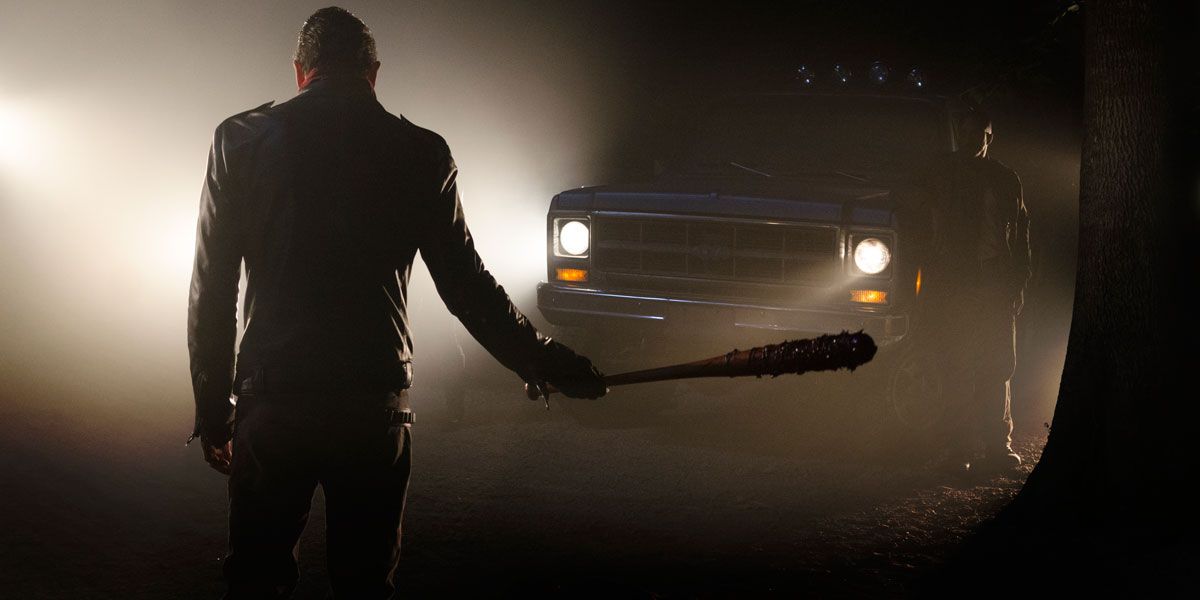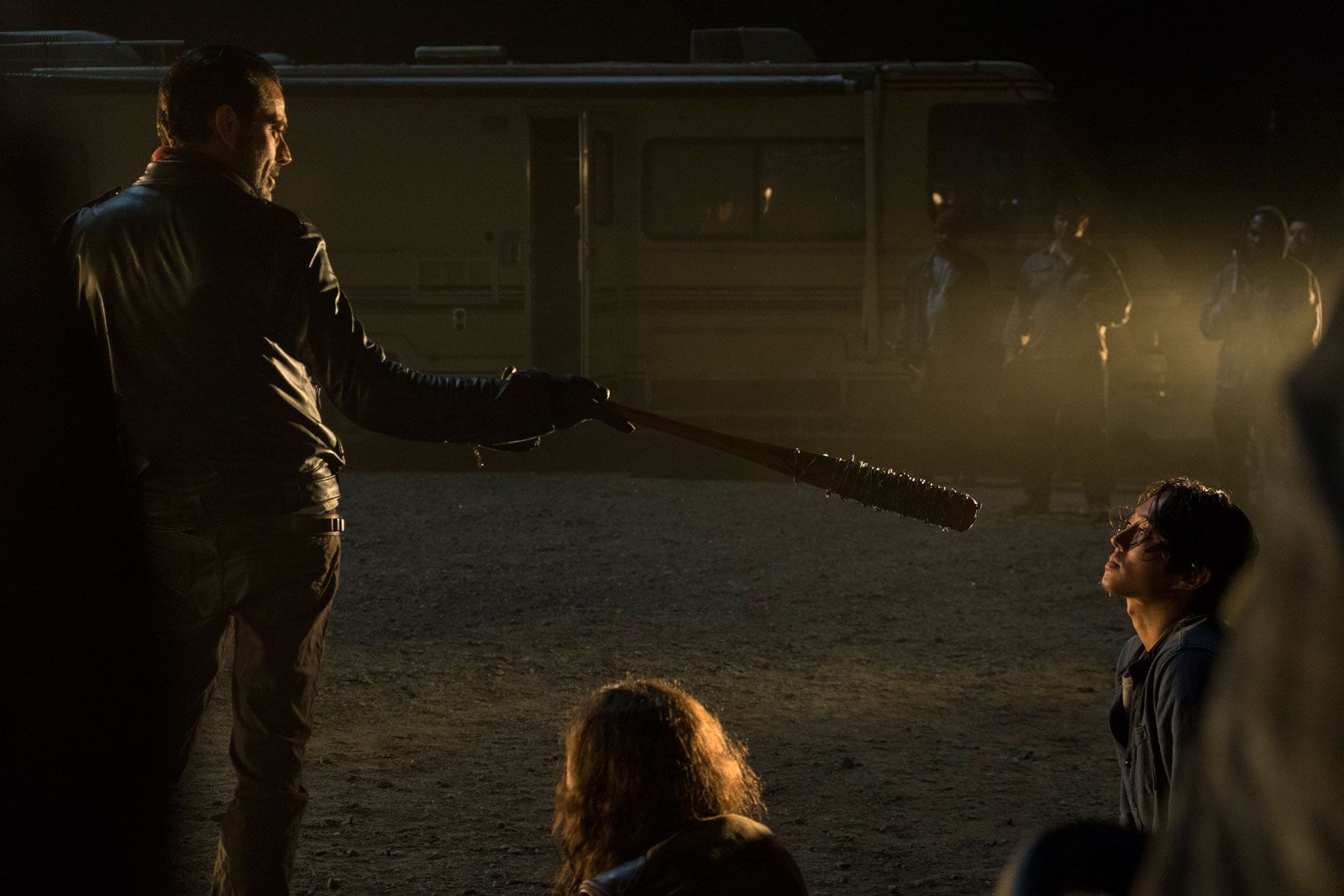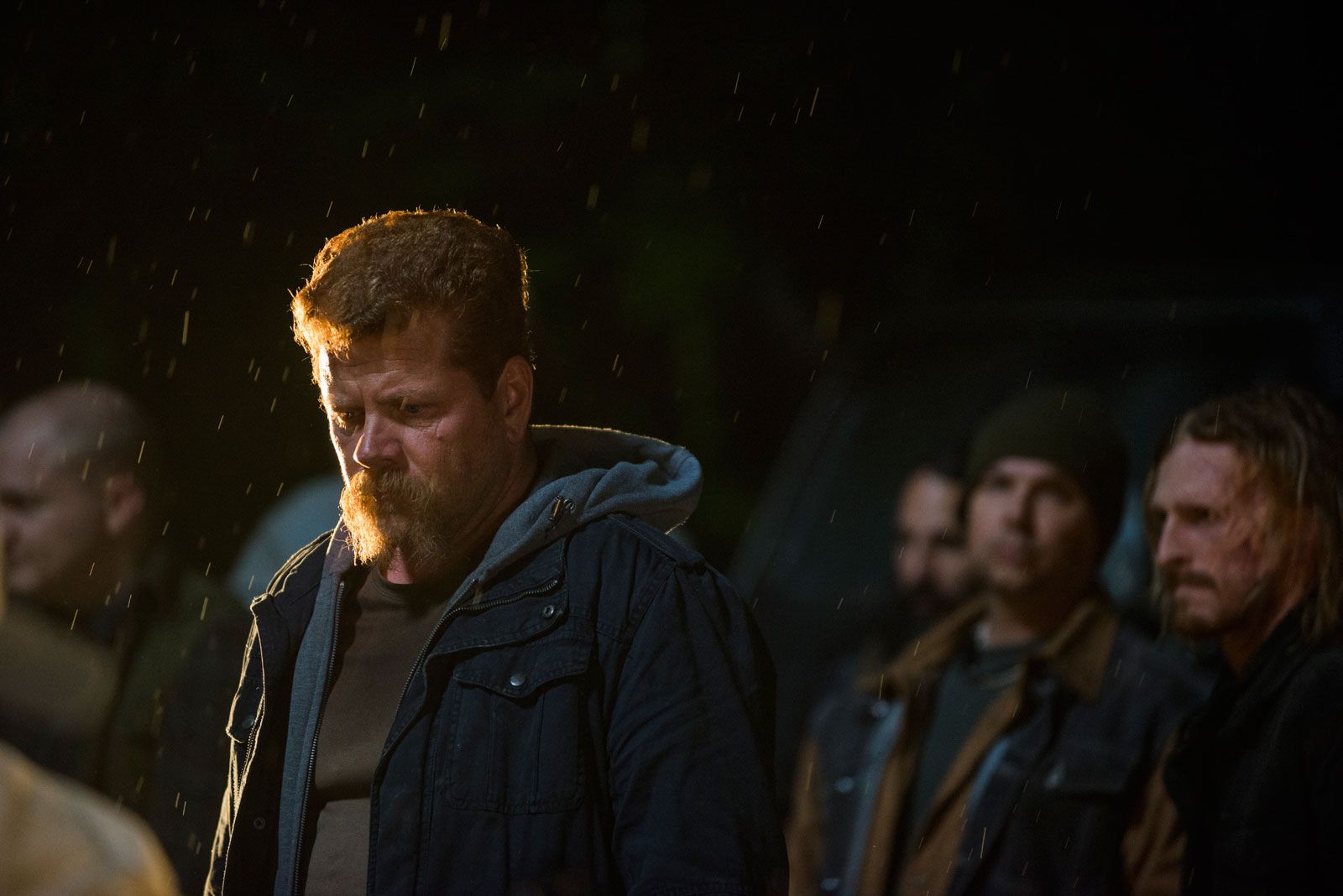SPOILER WARNING: The following article contains major spoilers for last night’s Season Seven premiere of AMC’s “The Walking Dead,” as well as previous episodes and the Image Comics series. Proceed at your own risk.
Are you sick of talking about last night's "The Walking Dead" yet? No? Good. In the wake of Sunday's shocking season seven premiere, there's still loads to discuss. So we couldn't resist an opportunity to jump on a conference call with co-executive producer Greg Nicotero, who also directed the much-discussed episode. While talking to reporters from a variety of outlets including CBR, he had a lot to say about the premiere, fans' reaction to last season's finale, the show's unflinching depiction of violence, why he decided to prolong the reveal of Negan's victim(s) and much more. Here are some of the highlights.
On the decision for Negan to kill not one, but two major characters:
Greg Nioctero: Part of the whole show is that we really needed to drive Rick and Negan's story throughout the season. We felt that one death would do the trick, but that the second death -- Glenn's death -- propelled us into a really different direction. It's about Negan laying down the law and saying "Listen, guys: bottom line is if you listen to me, you'll be fine. But if you step out of line, that's not going to fly."
So Glenn's death has a lot to do with Rick's future story, Maggie's future story, and certainly Daryl's future story. Daryl was the one who launched himself at Negan. It just made for a richer overall story arc for a lot of the characters.
On waiting over 20 minutes to reveal the victims' identities:
If you stand back and look at the episode, the majority of it is from Rick's point of view, picking up moments after the death and going into Negan trying to break [him]. He basically says "I'm gonna kill you. Maybe not today, maybe not tomorrow, but I'm gonna kill you." Negan realizes that Lucille itself didn't do the trick. So the episode is really about Negan's efforts. He sees the tremendous value in Rick in his people, so he's going to go the extra effort. By having that moment where Rick is stoic and Rick is defiant, it takes us about 10 or 12 minutes into the episode where Rick's starting to feel lost and starting to feel defeated. He's on the top of the RV, and everything starts flashing back to him.
The episode is 100 percent designed for you to go on this journey with Rick and start thinking as he did about what happened. When he starts reliving it, it's the beginning of him being broken. By the end of the episode, that's where he ends up. Even if you think about that scene where we see Abraham killed and then Glenn killed, that scene all starts with Rick's point of view. The camera's panning left, then the camera's panning right. We're close up on Rick's eyes. Very, very close. It really was about Rick remembering those moments as an effort to not let it happen again. When he sees it happen to Maggie and he sees it happen to Carl and he sees it happen to Daryl and everyone else, that's his traumatized way of balancing what to do next. Everything that he does is based on the fact that maybe someone else could die, and that he can't let that happen.
On the show's excessive violence, and how it's turned off some viewers:
It's intense. A lot of people that read the comic book and the graphic novels -- these moments have been ingrained in their brain. I remember sitting next to Steven [Yeun] when I read issue #100, and talking with him and Robert [Kirkman] about it. What struck me about it is that it was horrifically graphic and senseless and brutal. I wanted to try and capture those moments. When we were designing the makeups and testing the makeups, we wanted to push it a little bit.
When we shot the Season Five opener at the trough, we went down the line and showed these guys getting murdered and drained of blood. That was a purely a mechanism to show how bad the people at Terminus really were. With Negan, you only have to see that once or twice to know that this guy is serious. The haunting remnants of that episode are very similar to how I felt when I read the comic book and experienced that sense of loss; that futility of not being to step in. Rick Grimes is unable to stop this, and that's something that we've never seen in the show. I think the violence and the brutality are part of it. But there's also a helplessness -- seeing our hero completely crushed in front of us is more disturbing than the actual violence.
On whether or not he sees Negan as psychotic:
I never got the sense that Negan was crazy. If you turn around and look at what Rick and his group have done to survive and protect their way of life... last season, they attacked an outpost and killed like 22 Saviors in their sleep. That's pretty brutal if you take it out of the context of identifying with Rick and his group. I think there's a weird alternate universe where, from Negan's perspective, Rick's a pretty bad guy, because he just showed up and killed a bunch of his people.
To me, Negan's rules are how he's been able to survive. You've got to think about that in this world. Every single one of these people...in their perspective, they've done something right because they're still around. Negan's been able to build this army by saying "Listen, guys, I will keep you protected. I will keep you safe. I will keep you fed and alive. You just have to follow my rules. If you follow my rules, you will live." That's pretty powerful. So I think that when Negan hits Glenn, then looks over, sees Maggie, and says "I'm really sorry about this," he's not screwing around. He really does feel bad for what he's about to do. But he needs to remain a man of his word. So I don't really see Negan as crazy. There's definitely menace and there's definite sadistic brutality there. But he's still alive, and he still has all these people working with him. In his mind, it's still working.
On what Jeffrey Dean Morgan brings to the role:
Jeffrey brings the nuances of the smile and the charm; of a guy who's definitely engaging. Then he immediately goes into that menace. When he grabs Rick's face, you just see how powerful he is. That, to me, is what Jeffrey brings. Jeffrey brings that unpredictability to a guy who can go from a little sarcastic and wisecracking to a guy who is 100 percent in charge. Think about the fact that we've never seen fear on Rick's face. We've never seen Rick Grimes broken. This guy has been able to do something that no one else has been able to do ever. The Governor never broke him. The people of Terminus never broke him. And now he's broken. So Jeffrey brings that swagger and that menace and that sort of coiled-cobra intensity to Negan, the idea that he could strike at any moment.
On the peace sign Abraham flashes to Sasha before dying:
There was a moment that we shot in the beginning of Season Six where they're all recovering from Rick having shot Pete, and Abraham's kneeling right next to him. Then there's a shot where Sasha's going up the steps to the brownstone, and Abraham walks past her. He's a little drunk and he gives her a peace sign. When we were on set, we wanted to find an opportunity to have him speak to her without having to look at her. We were already locked in at that point to the season finale, where the point of view is on Negan. So that was something that Michael [Cudlitz] added, and it was a beautiful little moment. That little peace sign was to her.
On teasing that Rick might lose his hand, similar to how he does in the comics:
It's interesting, because that was definitely something that wasn't done consciously. I think the right-hand stuff was really written to play into what was going to happen at the end of the episode with Rick and Carl. It was something that we hadn't planned on, but definitely started leaning into as we put together the episode. But that's just me. [Showrunner] Scott Gimple might have a different take on that. But I do know that, as we were prepping and shooting the episode, there was never a conscious decision to say, "Let's tease the audience and make them feel like Rick's going to lose his hand." There's enough going on to the episode as is.
On what films are touchstones for this current season:
This is my Scorsese's "Goodfellas" or "Taxi Driver," or Brian DePalma's "Untouchables." There's so much of that. We were talking about the scene with DeNiro around the table in "The Untouchables" when he gets up and whacks the guy with a baseball bat to prove his point to all those other lieutenants. I think that's much more where our world is. It's about the balance and shift of power. Negan is clearly now 100 percent in control.
"The Walking Dead" airs 9 p.m. Sundays on AMC.



